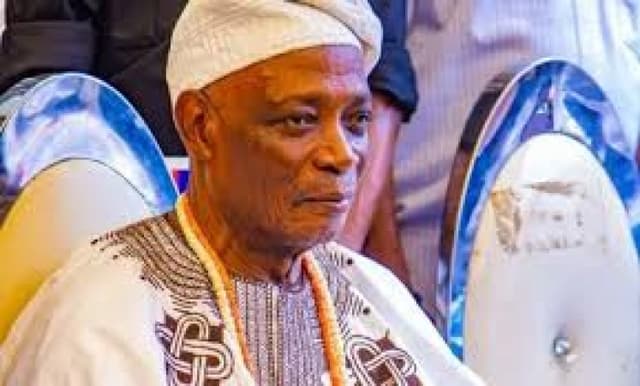
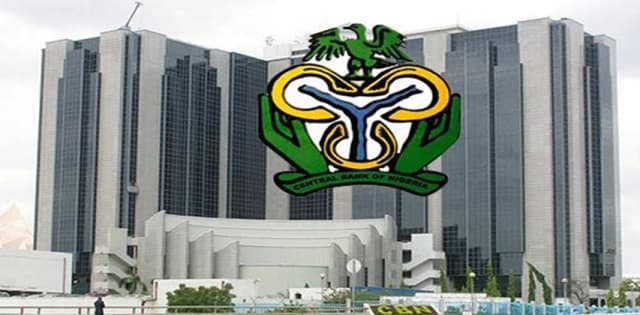


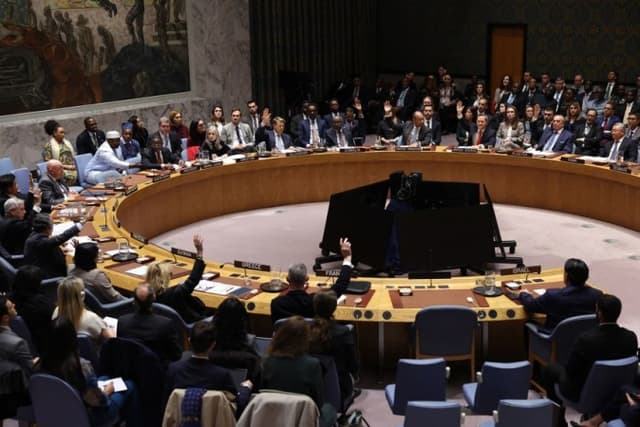






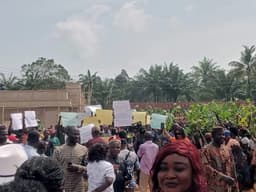

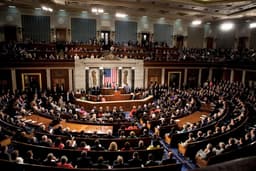
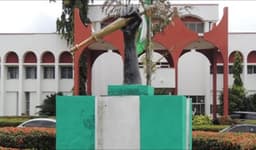

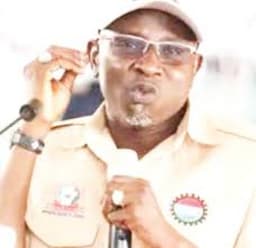

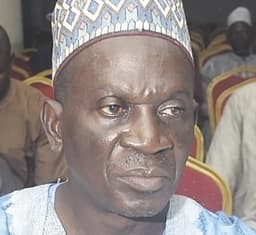

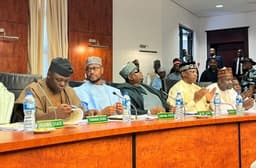
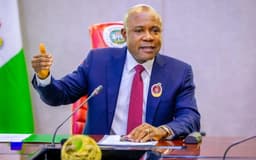





NEWS EXPRESS is Nigeria’s leading online newspaper. Published by Africa’s international award-winning journalist, Mr. Isaac Umunna, NEWS EXPRESS is Nigeria’s first truly professional online daily newspaper. It is published from Lagos, Nigeria’s economic and media hub, and has a provision for occasional special print editions. Thanks to our vast network of sources and dedicated team of professional journalists and contributors spread across Nigeria and overseas, NEWS EXPRESS has become synonymous with newsbreaks and exclusive stories from around the world.

Aminu Alkali, Taraba State Deputy Governor
The prolonged absence of Taraba State Deputy Governor, Aminu Alkali, from public life despite his reported return from a four-month medical trip, has sparked renewed concerns over transparency, governance, and constitutional accountability in the state.
The concerns have continued to gather momentum amid mounting speculation and an information blackout by government officials.
But the state Commissioner for Information, Emmanuel Bello, told Daily Trust in a telephone interview yesterday that the deputy governor would perform his functions when they come.
Bello said, “The deputy governor was not feeling too well. But he is back to the state. His duties are spelt out in the constitution. So when those kind of duties come, he will carry them out.”
On why he has not made any public appearance or addressed journalists in the state since his return, Bello said, “He will do that.”
Alkali, who returned to the state last week following a four-month medical trip abroad, has remained away from public view with heavy security mounted around his residence.
Despite his arrival in Jalingo, the state capital, government officials have remained tight-lipped about his health condition. Journalists covering the state, including those assigned to the deputy governor’s office, have been denied access to him, further fuelling public anxiety and speculation.
Similarly, no official communication was made about Alkali’s return, and his arrival at the Danbaba Suntai Airport went unannounced and undocumented by the press. A week later, the deputy governor is yet to make any public appearance or statement.
Sources told Daily Trust that Alkali was initially admitted to the National Hospital in Abuja before being flown to Egypt when his condition deteriorated. However, since his return to Jalingo, there has been no formal statement from the government concerning his health or when he might resume official duties.
Access to the deputy governor has reportedly been restricted to the permanent secretary in his office and a few high-ranking officials. Even staff and members of the press attached to his office have been barred.
A source in his office confirmed that Alkali is recuperating and has received a few visitors, including top government officials, since returning. However, visits by some deputy governors from other states were reportedly suspended.
A senior government official, who requested anonymity, dismissed rumours of Alkali’s deteriorating health, insisting that the deputy governor is recovering and occasionally meets with selected officials and family members at his official residence.
“He just returned from a long hospital stay and needs rest. That is why access to him is restricted, even for journalists,” the official said. “Take my word for it; I swear to Allah, the rumours about his condition are false. He is recuperating.”
Despite these reassurances, the absence of an official update continues to raise questions. Efforts by Daily Trust to get a clearer picture of Alkali’s condition were unsuccessful, as no government official was willing to speak on the record. One official redirected enquiries to the Secretary to the State Government (SSG), Mr. Timothy Kataps, who did not respond to calls.
Historical precedents in Taraba fuel concerns
The uncertainty surrounding Alkali’s prolonged absence and the state government’s silence echo previous controversies in Taraba, where similar situations have sparked political tension and public anxiety.
In 2012, then Governor Danbaba Suntai suffered serious injuries when the small aircraft he was piloting crashed near the Yola Airport in Adamawa State. Suntai, who was a licensed pilot, sustained head trauma and multiple fractures. After initial treatment at the National Hospital in Abuja, he was flown to Germany for further medical care. From there, he was transferred to the renowned Johns Hopkins Hospital in Baltimore, United States, before later being admitted to a trauma rehabilitation centre in Staten Island, New York.
Suntai spent 10 months abroad receiving intensive treatment before he was flown back to Nigeria on August 25, 2013. Upon his return to Jalingo, claims by his loyalists suggested he was fit to resume office. However, he did not address the press or make any public appearances. Even more worrying was a viral photograph showing him being assisted by aides as he disembarked from the aircraft—a sight that deepened concerns about his physical and cognitive state.
This silence from government officials and the lack of a definitive public appearance gave rise to months of political turmoil. Members of the state cabinet, the legislature, and the public were divided, with many arguing that the governor was not fit to continue in office. Critics alleged that he was being shielded and effectively “imprisoned” by his inner circle to protect vested interests. Despite sustained political pressure, transparency remained elusive. Suntai never fully recovered and later died in 2017.
In a more recent case, then-Governor Darius Ishaku triggered similar speculations in 2019 after returning from a vacation abroad. Upon arrival, Ishaku remained conspicuously absent from public functions for several weeks. Reports emerged that aides had barred journalists and members of the public from taking photographs of him at the airport. The governor cancelled previously scheduled engagements and did not attend the Workers’ Day celebration at the Jolly Nyame Stadium, where hundreds of civil servants had gathered expecting to see him.
The governor’s continued absence sparked growing concern that he was ill, although no official statement confirmed or denied this. Eventually, the speculation was dismissed by his political adviser, Abubakar Bawa, who denied any ill health, saying Ishaku had simply taken time to rest and work behind the scenes.
These past incidents, now recurring with Alkali’s case, have cemented a pattern in Taraba politics where public officials’ health conditions are treated with secrecy, leaving citizens in the dark and fuelling speculation.
SANs weigh in
Beyond the growing concerns about transparency, questions have also emerged about the legal framework governing the absence of a deputy governor and the duration for which such a public official can be absent from office before losing their seat.
Senior advocates and other legal experts who spoke with Daily Trust on the deputy governor’s continued absence offered varied interpretations of the law, particularly on constitutional provisions regarding an elected official’s prolonged inability to perform their duties.
While some argued that the issue lies squarely with the state legislature, others insisted that a maximum of 90 days is allowable under constitutional convention—though all agreed that the resolution depends largely on the political will of key actors in government.
John Baiyeshea (SAN) noted that the constitution is largely silent on the matter.
“The constitution does not give a grace period to report back to work. It left it at the doorsteps of those who should complain,” he said. “If it was an ordinary civil servant, I think it’s a maximum of six months. But an elected governor or his deputy can be removed if such a person is incapacitated in any way and not able to discharge the functions of the office.
“Those who can table the matter for action would be the House of Assembly, the governor, or concerned citizens who can raise a lot of dust. However, all of them appear to be passive or not bothered in this case, and there is nothing anybody can do about it.”
Dayo Akinlaja (SAN) echoed the same position, saying, “There is no time limit. He can remain in office except those concerned take the necessary steps once they discover he is medically unfit for the office.
“This is the responsibility of the legislature to take the necessary steps, and if they don’t, there is nothing anybody can do.”
Akin Akintoye (SAN) also agreed that the law is silent on how long the deputy governor can remain absent from office due to ill health or similar circumstances.
“That should be a ground for his removal,” he said. “But the proper thing would have been for the House of Assembly to investigate the circumstances of his absence and take a decision.”
However, Barrister AbdulAzeez Ayodeji Ibrahim provided a more definitive timeline.
“He can only be in office for 90 days, after which the matter can be tabled before the House of Assembly for a replacement because of his incapability to go over the rigours of his office as a result of his mental state or ill health,” he said.
He also pointed to the political dynamics involved: “This scenario usually occurs when the governor and his deputy are not on the same page. Otherwise, he will be protected until the end of his tenure.” (Daily Trust)